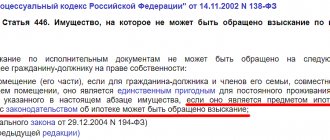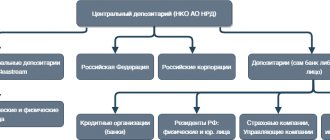In accordance with Part 4 of Art. 80 of the Federal Law of October 2, 2007 N 229-FZ “On Enforcement Proceedings” (hereinafter referred to as the Law on Enforcement Proceedings) “the seizure of the debtor’s property includes a prohibition to dispose of property, and, if necessary, a restriction of the right to use property or seizure of property.” It is interesting that this legal norm is intended to limit the property rights of the debtor in the well-known triad of “possession, use, disposal,” only in the reverse order.
Seizure at the request of the claimant
When initiating enforcement proceedings, the bailiff gives the debtor a period for voluntary execution. At the same time, the bailiff, according to Art. 80 of the Law on Enforcement Proceedings, without waiting for the expiration of the period for voluntary execution, including simultaneously with the initiation of enforcement proceedings, he has the right to seize the debtor’s property, if, of course, it is known what specific property belongs to him.
The claimant may file an application to seize the debtor's property, and the bailiff must either seize or refuse to seize, and, as a general rule, he must indicate the reasons for such refusal. The bailiff must consider the petition no later than the next day after its filing.
If the debtor had property and it was alienated due to non-seizure by the bailiff, this fact may serve as the basis for the recovery of funds from the bailiff service.
Sequence of seizure
In accordance with Art. 94 of the Law on Enforcement Proceedings, when selling the property of a debtor organization, priority must be applied, i.e. first, as intended by the legislator, something should be implemented that will not greatly affect the performance of the organization (finished products, office design items, etc.). However, when making an arrest, the order of priority does not apply.
At the same time, the arrest of the first property that comes across does not relieve the bailiff from the obligation to subsequently carry out actions to identify other property of the debtor, which may be foreclosed on in the previous turn (clause 41 of the Resolution of the Plenum of the Supreme Court of the Russian Federation of November 17, 2015 N 50 ).
Arrest does not apply
Seizure does not apply if the amount of collection is less than 3 thousand rubles, with the exception of seizure of funds, seizure when securing a claim and seizure of pledged property.
Seizure of pledged property to secure a claim
According to Part 3.1 of Art. 80 of the Law on Enforcement Proceedings, the seizure of the pledged property in order to secure the claim of a claimant who does not have an advantage over the pledgee in satisfying the claims is not allowed.
It is obvious that this legal norm is included in the Law for the following reason: for example, the bailiff receives a writ of execution to seize the debtor’s property to secure a claim for a specified amount. He makes inquiries, and the answer comes from Rosreestr that the debtor has real estate, but it is pledged (and not from the claimant under the writ of execution). The bailiff seizes the pledged property and considers that he has fulfilled everything. However, this arrest will be a fiction, since the claimant, who is not the mortgagee, as a rule, does not receive anything after the sale of such property. Thus, this legal norm is aimed at ensuring that the bailiff looks for property other than the pledged property for seizure, so that after the decision is made there is something to foreclose on.
The need to draw up an act of seizure
In accordance with Part 5 of Art. 80 of the Law on Enforcement Proceedings, seizure of the debtor’s property (except for seizure executed by the registration authority, seizure of funds held in accounts in a bank or other credit organization, seizure of securities and funds held by a professional participant in the securities market in the accounts specified in Article 73 and 73.1 of this Law) is carried out by a bailiff with the participation of attesting witnesses with the drawing up of an act of seizure (inventory of property).
In other words, it is obvious that the seizure of real estate is carried out by the registering authority and a property inventory report must be drawn up in accordance with Part 5 of Art. 80 of the Law on Enforcement Proceedings is not required. However, in Part 1 of Art. 86 of the mentioned Law, we see that it turns out that the debtor’s real estate, which is seized, must be transferred under protection against signature in the act of seizure to the debtor or members of his family appointed by the bailiff, or to the person with whom the Federal Judicial Service bailiffs or its territorial body concluded an agreement.
The same thing in Part 8 of Art. 89 of the said Law: when transferring real estate for sale, a copy of the act of seizure of the debtor’s property must be attached to the decree of the bailiff and the act of acceptance and transfer.
It seems that Art. 80 of the Law on Enforcement Proceedings was written by one group of lawyers, and Art. Art. 86 and 89 are different. However, this is most likely how it was.
Ensuring the execution of a court decision
In accordance with paragraph 40 of the Resolution of the Plenum of the Supreme Court of the Russian Federation of November 17, 2015 No. 50, in pursuance of a judicial act to seize the property of the defendant, the bailiff makes an arrest and establishes only those restrictions and only in relation to that property that are specified by the court . In other words, based on this Resolution, the bailiff does not have the right to seize a movable thing seized to secure a claim if the debtor is ready to take it himself for safekeeping, and only in cases where the debtor prevents the execution of a judicial act on the seizure of property by judicial act on the seizure of the debtor's movable property, including through refusal to accept the seized property for storage, the bailiff has the right to transfer the seized property for safekeeping to members of the debtor's family, the collector or the person with whom the territorial body of the FSSP of Russia has concluded a storage agreement, with taking into account the requirements established by Art. 86 of the Law on Enforcement Proceedings.
But if the court took an interim measure in the form of seizure of the defendant’s property, establishing only its total value, then the specific composition of the property subject to seizure and the types of restrictions in relation to it are determined by the bailiff according to the rules of Art. 80 of the mentioned Law.
Proportionality of seizure
Even before the introduction of the institution of bailiffs, there were disputes about the possibility of seizing and selling the debtor’s property, which significantly exceeds the amount of the debt. The Enforcement Proceedings Act 1997 ignored this topic. In the Law on Enforcement Proceedings of 2007, one of the principles of enforcement proceedings was the principle of correlation between the scope of the claimant’s claims and enforcement measures. In addition, it was indicated that in accordance with Part 2 of Art. 69 of the Law, foreclosure on property is allowed in the amount of the debt, i.e., in essence, it states that foreclosure on the debtor’s property must be proportionate to the volume of the claimant’s claims <1>. However, the question of the possibility of seizing and selling property, the value of which significantly exceeds the amount of debt, if there is no other property, was again ignored.
And finally, in paragraph 41 of the Resolution No. 50 of November 17, 2015, the Plenum of the Supreme Court of the Russian Federation indicated that the seizure is disproportionate in the case when the value of the seized property significantly exceeds the amount of debt under the writ of execution in the presence of other property, which may subsequently foreclosure, and at the same time, such an arrest is permissible if the debtor did not provide the bailiff with information about the presence of other property that can be foreclosed on, or if the debtor does not have other property, its illiquidity or low liquidity.
About the ban on registration actions
From the meaning of Art. 80 of the Law on Enforcement Proceedings, courts often saw the need to draw up an act of seizure simultaneously with the issuance of a resolution to seize the debtor’s property. Without this, they considered the arrest invalid, recognized the actions of the bailiff as unlawful and applied the appropriate legal consequences. And since issuing a resolution with the simultaneous drawing up of an act is very inconvenient for the bailiff, and is not always possible, instead of a decree on seizure, a basically surrogate decree prohibiting registration actions appeared. I don’t use the word “surrogate” with a negative connotation; it’s just that in place of broken legal norms, as a rule, similar legal loopholes appear. The resolution on the ban by the bailiff service has been used for a long time, but it was “legalized” <1> it was only in the Resolution of the Plenum of the Supreme Court of the Russian Federation dated November 17, 2015 N 50. So, in particular, paragraph 42 of the said Resolution states that the list of enforcement actions given in Part 1 of Art. 64 of the Law on Enforcement Proceedings is not exhaustive and the bailiff has the right to take other actions if they correspond to the tasks and principles of enforcement proceedings and do not violate the rights of the debtor and other persons.
The Plenum indicated that such actions include the establishment of a ban on the disposal of property belonging to the debtor (including a ban on registration actions in relation to it). At the same time, a ban on the disposal of property is imposed in order to ensure the execution of the writ of execution and to prevent the disposal of property, which may subsequently be subject to foreclosure, from the possession of the debtor in cases where the bailiff has reliable information about the presence of individually determined property in the debtor's possession, but at the same time, it is difficult to detect and (or) make an inventory of such property for one reason or another (for example, when a vehicle belonging to the debtor is hidden from collection). The bailiff must send a resolution to impose a ban on the disposal of property to the relevant registration authorities.
However, after discovering the actual location of the property and the possibility of inspecting and inventorying it in order to foreclose on it, the bailiff is obliged to take all necessary actions to seize the said property of the debtor according to the rules provided for in Art. 80 of the Law on Enforcement Proceedings.
Arrest on the only housing
Statement of the problem: the bailiff discovers the debtor’s only home and seizes it or, most often, simply prohibits registration actions in relation to this property, while by virtue of Art. 446 of the Code of Civil Procedure of the Russian Federation, he cannot foreclose on the only housing. The debtor comes to the bailiff and asks to cancel the order banning registration actions, arguing that it is pointless to impose a ban, since it is impossible to foreclose on this housing. The bailiff most often refuses the debtor. Who is right? The Plenum of the Supreme Court of the Russian Federation in its Resolution No. 50 in paragraph 43 clarified that arrest as an interim measure or a ban on disposal can be established for the things listed in paragraph. 2 and 3 hours 1 tbsp. 446 of the Code of Civil Procedure of the Russian Federation, property belonging to a debtor-citizen. At the same time, the arrest as an interim measure of residential premises owned in whole or in part by the debtor-citizen, which is the only one suitable for permanent residence of the debtor himself and his family members, as well as the establishment of a ban on the disposal of this property, including a ban on the occupancy and registration of other persons, in itself cannot be considered illegal if these measures are taken by the bailiff in order to prevent the debtor from disposing of this property to the detriment of the interests of the claimant.
The only thing we must remember is that, according to this Resolution, the seizure or establishment of a corresponding ban should not prevent the debtor citizen and members of his family from using such property.
Seizure on joint property
For the obligations of one of the spouses, recovery may be applied to his share in the common property of the spouses, which would be due to him upon division of this property (Article 256 of the Civil Code of the Russian Federation).
Let’s say the debtor does not have enough property, and we decide to foreclose on his share of the spouse’s property. To foreclose on a share in joint ownership, the claimant must go to court, but the court process takes a long time and the spouse can alienate the property during the trial. Hence the question: can a bailiff prohibit registration actions in relation to the property of the debtor’s spouse? The Plenum of the Supreme Court of the Russian Federation in paragraph 44 of Resolution No. 50 of November 17, 2015 answers positively: “In order to ensure the rights of the creditor on the basis of parts 1 and 4 of Article 80 of the Law on Enforcement Proceedings, the seizure or establishment of a ban on disposal (ban on making registration actions) is possible in relation to property that is in common joint ownership of the debtor and another person (persons), until the determination of the debtor’s share or before its division.”
Property registration
The debtor may have property <1>, but due to the lack of state registration, it is impossible to properly seize and foreclose on this property. This situation arises in a number of cases, for example, the debtor enters into an inheritance, but does not want to register the property in his own name, or the debtor has entered into a purchase and sale agreement, but again does not register ownership, etc. In these situations, the bailiff in accordance with Art. 66 of the Law on Enforcement Proceedings has the right to apply to the relevant body for state registration of property rights. But that is not all. In accordance with paragraph 53 of the Resolution of the Plenum of the Supreme Court of the Russian Federation dated November 17, 2015 N 50, the bailiff has the right not only to apply for state registration of the debtor’s ownership of property, as well as other property rights belonging to him, subject to state registration, but also challenge in court the suspension and refusal of state registration of rights.
Moreover, if it is impossible to obtain from the debtor the documents requested and necessary for state registration of his rights to real estate, then the bailiff may apply to the authorized bodies for the preparation of such documents.
The bailiff also has the right to contact the other party to a transaction for the alienation of real estate, in which the acquirer is the debtor, with a proposal to take actions aimed at state registration of the transfer of ownership. If the other party to the transaction agrees to perform these actions, a resolution of the bailiff is submitted to the registration authority along with its application.
If the other party nevertheless refuses to perform such actions, state registration of the transfer of ownership of real estate to the debtor is carried out in the manner of litigation at the request of the bailiff in accordance with paragraph 3 of Art. 551 Civil Code of the Russian Federation.
The court's decision to satisfy the specified request of the bailiff is the basis for state registration of the transfer of rights to real estate.
Ownership of movable property by the debtor
Israeli legislation governing the execution of court decisions stipulates that all property located in the debtor’s house, as well as on his land plot, is considered his property, unless the debtor or another person proves otherwise, and vice versa, all property located outside the territory belonging to the debtor is not the property of the debtor, unless the bailiff proves otherwise.
In our legislation on enforcement proceedings there is no such legal norm, i.e. As a general rule, in the context of the civil legislation of Russia, a movable thing belongs to the person in whose actual possession it is located, if, in accordance with the law, contract or other proven grounds, it does not belong to another person, but questions arise from time to time among the parties to enforcement proceedings.
And in the Resolution of the Plenum of the Supreme Court of the Russian Federation dated November 17, 2015 N 50, an explanation appeared on this issue: “Until otherwise is proven by interested parties, the debtor-citizen owns movable property that can be foreclosed on, either indoors or on a fenced (protected) ) from access of other persons to a land plot owned and (or) in the possession of the debtor is presumed” (clause 59); “the issue of foreclosure on the debtor’s property held by third parties is subject to resolution by the court upon the application of the recoverer or bailiff (parts 1 and 2 of Article 77 of the Law on Enforcement Proceedings). The burden of proving that the property belongs to the debtor in this case rests with the applicant. Lawful possession and use of the debtor’s property by third parties does not prevent the resolution of the issue of foreclosure on him, however, these circumstances can be qualified as an encumbrance on this property and taken into account when assessing its value” (paragraph 61).
Seizure of pledged property
Is it possible to seize and foreclose on the pledged property under a writ of execution where the claimant is not the mortgagee?
The Law on Enforcement Proceedings says nothing about such a possibility. However, it should be noted that in general the legislation allows for the possibility of transferring ownership of the pledged property to another person as a result of paid or gratuitous alienation of this property, while in Art. 353 of the Civil Code of the Russian Federation states that the right of pledge remains in force.
In addition, in accordance with paragraph 67 of the Resolution of the Plenum of the Supreme Court of the Russian Federation of November 17, 2015 N 50, the bailiff can foreclose on the pledged property to satisfy the claims of a claimant who is not a pledgee, in the absence of other property. Foreclosure in this case is carried out taking into account the rules for the sale of property encumbered with the rights of third parties, including notifying the buyer that the property being sold is pledged, and, accordingly, preserving the pledge when the rights to the property are transferred from the pledgor-debtor to to the buyer. The sale of pledged property in the absence of the required notice and its acquisition by a person who did not know and should not have known that the property is the subject of pledge, by virtue of sub. 2 p. 1 art. 352 of the Civil Code of the Russian Federation entails the termination of the pledge. In this case, the pledgee has the right to demand compensation for losses from the person who is entrusted with the obligation to provide information about the encumbrance of the property, in other words, from the debtor, the bailiff or the seller of the property, depending on who concealed (willingly or unwittingly) the fact that the property is located in pledge.
Indeed, let’s assume that the debtor owns a vehicle for which he must pay 1 million rubles with interest, while he has paid 950 thousand rubles and has 50 thousand rubles left to pay. In this case, it is advisable to assume that the car should be seized and foreclosure should be applied to it, respecting the rights of the mortgagee. Therefore, when evaluating a car, the remaining amount of the loan is taken into account, and the person who bought the specified car as a result of its sale by a bailiff becomes the owner of the vehicle with the condition that he repays the remaining amount of the loan from the bank, and in case of failure to fulfill the obligation he risks to be left without the specified car.
This picture is “darkened” by Art. 347 of the Civil Code of the Russian Federation, according to which the pledgee has the right to demand the release of the pledged property from seizure (exclusion from the inventory) in connection with foreclosure on it through enforcement proceedings. In other words, it does not matter how much the debtor has paid and how much remains to be paid on the loan. The pledgee may, by contacting a law enforcement officer or in court, demand that the seizure of the pledged property be lifted.
Example No. 2. “Victim of fashion” or is it possible to live in an apartment
You keep up with the times and decide to move. You wished to move from your grandfather’s old “Khrushchev” apartment, inherited, to new fashionable apartments in the LOFT style, located in one of the former industrial zones of Moscow. Commendable!
But there is one nuance - according to current legislation, apartments are non-residential commercial real estate, and not residential premises. Perhaps you will say: “how come, you can live in them!” And you will be right in your own way.
Nobody forbids you to live in them, but you won’t be able to make a permanent registration in your apartment, you will only be given a temporary one.
Due to the fact that apartments are not residential premises, they are subject to fewer requirements, including those related to social infrastructure. But they are also not covered by property immunity.
This means that if you do not have enough cash or other property to fully repay the debt to creditors, then during bankruptcy your apartments will be put up for sale. Even if you have nowhere to live!
Moreover, the sale of apartments to cover debts to creditors is possible - both by a bailiff at the stage of enforcement proceedings, and by a financial manager during bankruptcy proceedings.
What does “seizure of share” mean?
The owner of the seized property will not be able to perform the following actions with it:
- sell;
- exchange for other housing;
- indicate in the will;
- lay;
- rent out.
In other words, you cannot dispose of it, but you can use it for personal purposes.
How to find out about the seizure of a share?
You don’t have to go to the bank or bailiff to get information. You can find out who initiated the arrest and when it was imposed from the USRN extract. To obtain it, you must contact the Rosreestr branch or the MFC. You can come to the branch in person or order a document electronically by registering in the ESIA system.
Price issue
Receiving an extract in paper form costs 400 rubles for citizens. (for legal entities - 1200 rubles ). If you need a document in electronic form, the state fee will be 150 rubles. and 300 rub. for individuals and legal entities, respectively.
It is important to know! How to protect property from seizure by bailiffs
Can they take away their only home if it has a mortgage?
If the housing was purchased using mortgage funds and is collateral, then, unfortunately, the bank has the right to take it away. Consequently, the creditor has the right to take the apartment for debts if it is mortgaged and even if it is the only one.
Moreover, creditors can take the apartment for debts, even if a child is registered in it.
It is worth considering that it is not profitable for the bank to take away an apartment, and even more so a house, to pay off debts, since it is necessary to spend time and money on the sale of this property.
Therefore, if difficulties arise with the fulfillment of obligations, it is necessary to urgently contact the lender. In most cases, the bank will accommodate you halfway and offer, for example, to reduce monthly payments by increasing the mortgage term. “In this situation, it is advisable to contact the bank that provided the loan with an application for debt restructuring. In practice, the bank is often not interested in the judicial procedure of foreclosure on a mortgaged apartment, since this is a rather lengthy process. Therefore, if you intend to repay the debt in the future and justify the plan for restructuring your debt, there is a possibility that the bank will meet you halfway and agree on a new debt repayment schedule,” advises Konstantin Zautrennikov, leading lawyer.
How to seize a share in an apartment
Seizure of the debtor's property is necessary if the latter intends to sell it, donate it to third parties, or get rid of the share of the apartment in another way to prevent its alienation by the creditor.
To stop the actions of the violator it is necessary:
- draw up a motion to secure the claim;
- prepare supporting documents and submit them along with the petition to the court.
It is assumed that the court already has a statement of claim, for example, for compensation for damage incurred, for payment of the amount of the issued loan, including interest, or otherwise. Arrest is proposed as an interim measure for the safety of property (Article 140 of the Civil Code of the Russian Federation).
If housing is more expensive than debt?
“In practice, situations most often arise in which the amount of debt is much less than the value of the property.
In such cases, after the sale of real estate, the bailiffs return the remaining funds to the debtor. The main thing you need to remember is that you can’t just sell an apartment. There is a rule according to which the price indicated in the court decision (at market value) falls by 5, and after that by 10 percent,” notes Elena Krivonosova, lawyer at the legal service “Unified Center for Protection.” If there are funds left after the sale of housing, they will go to the account of the bailiff service. These funds are used to cover the costs of selling real estate (services) and other expenses for conducting enforcement proceedings (for example, enforcement fees), after which the remaining funds are transferred to the debtor’s account.
When applying for a loan, you need to soberly calculate your strength. If force majeure situations occur, you must immediately contact the bank.
VAT – 2022
The best speaker on tax topics, , will prepare you for filing your return on January 14 . There are 10 out of 40 places left for the online workshop . The flow is limited, as there will be live communication with the teacher live. Hurry up to get into the group. Sign up>>>
The procedure for appealing the arrest of a share in an apartment
To appeal an arrest, you need compelling reasons, because the actions of the bailiff are not aimed at depriving them of housing or infringing on the rights of the owner, but at ensuring the safety of property. At the same time, a civil servant must not overstep the bounds of the law.
The bailiff cannot:
- be in premises that do not belong to the debtor;
- make an inventory of property without permission issued by a senior bailiff;
- visit the debtor on weekends or at night.
You can appeal against the seizure of property if the value of the share is much higher than the amount of debt or the seizure violates the property rights of third parties.
To suppress illegal actions it is necessary:
- file a complaint;
- submit the document to the senior bailiff, to the court at the location of the FSSP branch (Article 360 of the CAS RF), to the prosecutor's office.
The complaint has a standard structure and can be filled out with the help of a lawyer or independently using the following example:
To file a complaint against a civil servant, the debtor is given 10 days from the moment the controversial decision is issued or the bailiff commits unlawful actions (Article 122 of Law No. 229-FZ). Deadlines
The period for consideration of a complaint by higher management is 10 days.
If a complaint is filed in court, the period for its consideration will be long - about 2 months , and when filed with the RF Armed Forces - up to 3 months.
You can contact the prosecutor's office at the same time as filing a complaint with the court or the FSSP. It should be noted that if measures have not been taken to resolve the issue in lower authorities, the complaint will be forwarded to lower competent authorities for further consideration.







